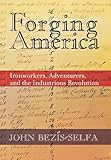Forging America : Ironworkers, Adventurers, and the Industrious Revolution / John Bezis-Selfa.
Material type: TextPublisher: Ithaca, NY : Cornell University Press, [2018]Copyright date: ©2003Description: 1 online resource (296 p.) : 14 halftonesContent type:
TextPublisher: Ithaca, NY : Cornell University Press, [2018]Copyright date: ©2003Description: 1 online resource (296 p.) : 14 halftonesContent type: - 9781501722196
- 338.47669109730903 21/eng/20230216
- online - DeGruyter
| Item type | Current library | Call number | URL | Status | Notes | Barcode | |
|---|---|---|---|---|---|---|---|
 eBook
eBook
|
Biblioteca "Angelicum" Pont. Univ. S.Tommaso d'Aquino Nuvola online | online - DeGruyter (Browse shelf(Opens below)) | Online access | Not for loan (Accesso limitato) | Accesso per gli utenti autorizzati / Access for authorized users | (dgr)9781501722196 |
Frontmatter -- CONTENTS -- ACKNOWLEDGMENTS -- INTRODUCTION -- 1. MASTERED BY THE FURNACE -- PART ONE. IRON AND EMPIRE: THE COLONIAL ERA -- 2. MOLDING MEN -- 3. PASSAGES THROUGH THE LEDGERS -- 4. THE BEST POOR MAN'S COUNTRY -- PART TWO. IRON AND NATION: THE EARLY REPUBLIC -- 5. INDUSTRIAL SLAVERY DOMESTICATED -- 6. MANUFACTURING FREE LABOR -- CONCLUSION -- ABBREVIATIONS FOR SELECTED ARCHIVES, MANUSCRIPT COLLECTIONS, AND SERIAL PUBLICATIONS -- NOTES -- INDEX
restricted access online access with authorization star
http://purl.org/coar/access_right/c_16ec
Stacks of stone preside over many bucolic and wooded landscapes in the mid-Atlantic states. Initially constructed more than two hundred years ago, they housed blast furnaces that converted rock and wood into the iron that enabled the United States to secure its national independence. By the eve of the Revolutionary War, furnaces and forges in the American colonies turned out one-seventh of the world's iron.Forging America illuminates the fate of labor in an era when industry, manhood, and independence began to take on new and highly charged meanings. John Bezís-Selfa argues that the iron industry, with its early concentrations of capital and labor, reveals the close links between industrial and political revolution. Through means ranging from religious exhortation to force, ironmasters encouraged or compelled workers—free, indentured, and enslaved—to adopt new work styles and standards of personal industry. Eighteenth-century revolutionary rhetoric hastened the demise of indentured servitude, however, and national independence reinforced the legal status of slavery and increasingly defined manual labor as "dependent" and racially coded. Bezís-Selfa highlights the importance of slave labor to early American industrial development. Research in documents from the seventeenth, eighteenth, and early nineteenth centuries led Bezís-Selfa to accounts of the labor of African-Americans, indentured servants, new immigrants, and others. Their stories inform his highly readable narrative of more than two hundred years of American history.
Mode of access: Internet via World Wide Web.
In English.
Description based on online resource; title from PDF title page (publisher's Web site, viewed 26. Apr 2024)


